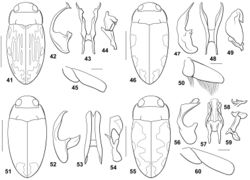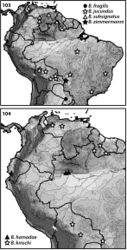Bidessodes hamadae
| Notice: | This page is derived from the original publication listed below, whose author(s) should always be credited. Further contributors may edit and improve the content of this page and, consequently, need to be credited as well (see page history). Any assessment of factual correctness requires a careful review of the original article as well as of subsequent contributions.
If you are uncertain whether your planned contribution is correct or not, we suggest that you use the associated discussion page instead of editing the page directly. This page should be cited as follows (rationale):
Citation formats to copy and paste
BibTeX: @article{Miller2017ZooKeys, RIS/ Endnote: TY - JOUR Wikipedia/ Citizendium: <ref name="Miller2017ZooKeys">{{Citation See also the citation download page at the journal. |
Ordo: ORDO
Familia: FAMILIA
Genus: Bidessodes
Name
Bidessodes hamadae Braga and Ferreira-Jr., 2009 – Wikispecies link – Pensoft Profile
- Bidessodes (Bidessodes) hamadae Braga and Ferreira-Jr., 2009: 46; Nilsson, 2016: 98.
Diagnosis
Specimens do not have modified prosternum. The prosternal process is flat with the lateral margins somewhat convex and the apex acuminate. The male mesotibia is bent basally. The metafemur and metatrochanter are unmodified. The male abdominal ventrite VI is impressed and sulcate apically. The male median lobe in lateral aspect is basally elongate with an elongate dorsally-directed flange, the apical portion is elongate, medially slightly expanded but nearly straight with the apex slightly hooked dorsally (Fig. 52). In ventral aspect the median lobe is broad with the lateral rami moderately broad, divergent basally, apically obliquely truncate with medial shallow emargination between the apices (Fig. 53). The lateral lobe has the apical segment irregular, broad and apically truncate. The basal portion is elongate Y-shaped (Fig. 54). Specimens are elongate-slender and relatively immaculate with an indistinct apical pale spot (Fig. 51).
Discussion
Only females were examined for this study and the figures of the male genitalia (Figs 52–54) are redrawn from Braga and Ferreira-Jr. (2009)[1].
Distribution
Known from north-central Brazil (Fig. 104).
Taxon Treatment
- Miller, K; 2017: A review of the Neotropical genus Bidessodes Régimbart, 1895 including description of four new species (Coleoptera, Adephaga, Dytiscidae, Hydroporinae, Bidessini) ZooKeys, (658): 9-38. doi
Images
|
Other References
- ↑ Braga R, Ferreira Jr N (2009) Three new species of Bidessodes Régimbart (Insecta, Coleoptera, Dytiscidae) from the Amazon river floodplain. Zootaxa 2034: 43–48.

